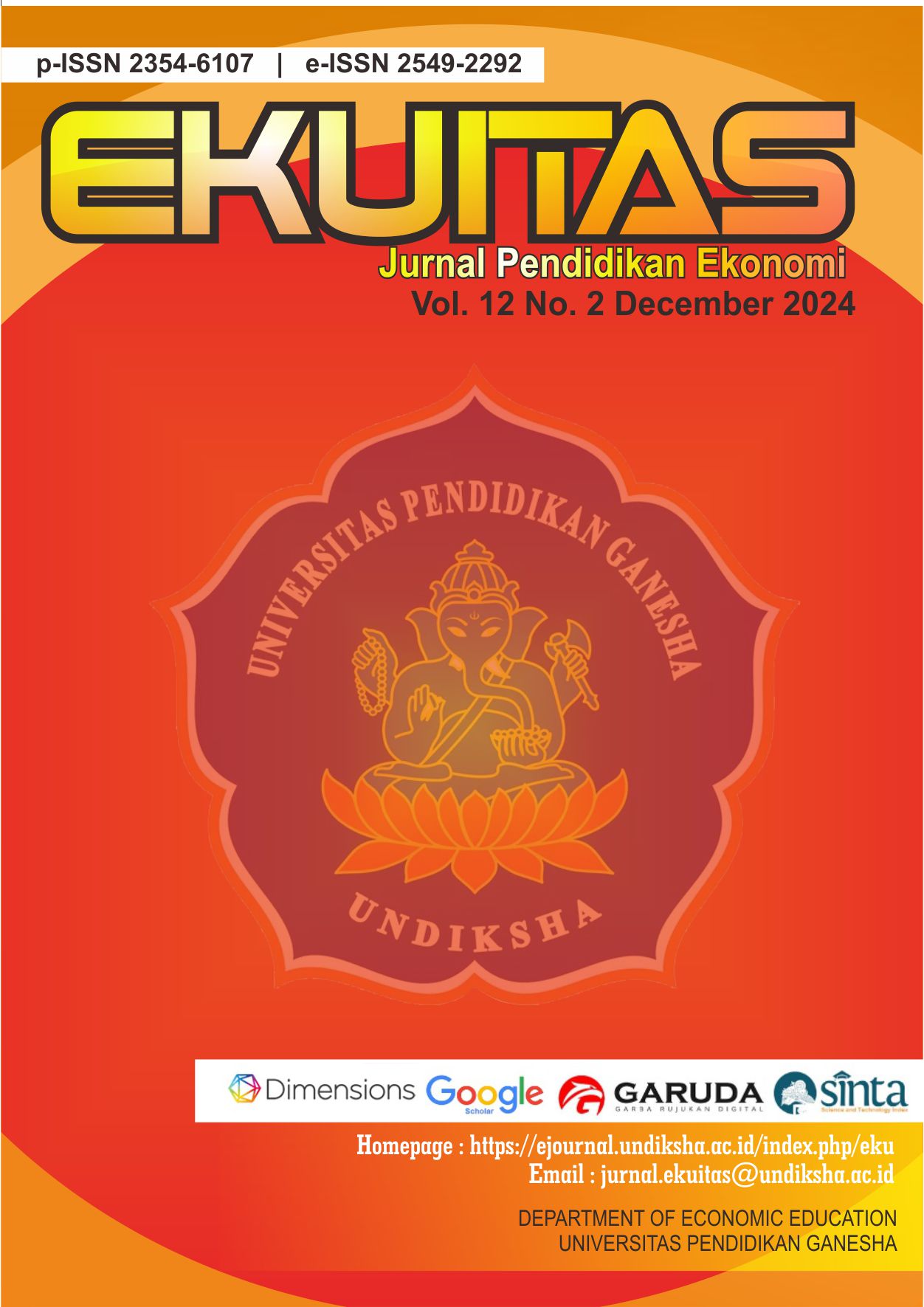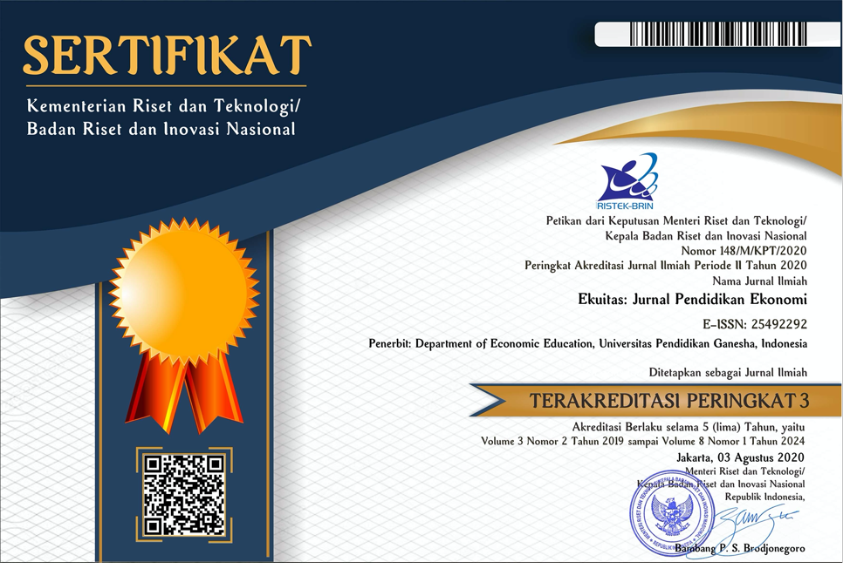Pengembangan Buku Ajar Strategi Pembelajaran Ekonomi Berbasis Project
DOI:
https://doi.org/10.23887/ekuitas.v12i2.85981Kata Kunci:
Development, textbooks, economics learning strategies, projectsAbstrak
The Economics Learning Strategy course is an elective course taken by students of the S1 Economics Education Study Program FEB UNESA. The characteristics of this course are not only planning activities to economic learning, but also provide instructions for designing learning activities and practicing how to carry out good economic learning to support effectiveness and efficiency to achieve lecture goals. Learning is arranged in a project-based RPS. A practical means of learning interaction is needed, namely relevant teaching materials in the form of textbooks. The method used in the development of this textbook is the ADDIE Model with the formulation of analysis, design, development, implementation, evaluation. From the results of expert validation, the feasibility level of the textbook is 79% for the material component, 77% for the presentation component, 72% for the language component, and 80% for the graphic component. Thus, it can be concluded that the textbooks developed are feasible Most of the students in the limited trial gave positive responses to all aspects of assessment. Textbook development is beneficial for students to learn independently.
Referensi
Abidin, Y. (2013). Pembelajaran Bahasa Berbasis Pendidikan Karakter. Bandung: Refika Aditama.
Arsanti, M. (2018). Pengembangan Bahan Ajar Mata Kuliah Penulisan Kreatif Bermuatan Nilai-Nilai Pendidikan Karakter Religius Bagi Mahasiswa. Jurnal Kredo, 1(2). https://doi.org/https://doi.org/10.24176/kredo.v1i2.2107
Cahyadi, A. (2019). Pengembangan Media dan Sumber Belajar: Teori dan Prosedur. Laksita Indonesia, 3.
Dwiyogo, W. D. (2008). Aplikasi teknologi Pembelajaran. Malang: Fakultas Ilmu Pendidikan Universitas Negeri Malang.
Hidayat, F., & Nizar, M. (2021). Model Addie (Analysis, Design, Development, Implementation and Evaluation) Dalam Pembelajaran Pendidikan Agama Islam Addie (Analysis, Design, Development, Implementation and Evaluation) Model in Islamic Education Learning. Jurnal UIN, 1(1), 28–37.
KEMENDIKBUDRISTEK. (2022). BERITA NEGARA REPUBLIK INDONESIA (Buku.Pendidikan.Penilaian.Pencabutan).
Kementerian Pendidikan dan Kebudayaan. (2020). Renstra Kemendikbud 2020-2024.
Majid, A. (2012). Perencanaan Pembelajaran. Bandung: PT Remaja Rosdakarya.
Mulyasa, H. E. (2014). Pengembangan dan implementasi kurikulum 2013. (Anang Solihin Wardan, Ed.) (1 ed.). Bandung: Remaja Rosdakarya.
OECD. (2019). PISA 2018 Results (Volume I). OECD. https://doi.org/10.1787/5f07c754-en
Pendidikan, K., Teknologi, D., Standar, B., Asesmen Pendidikan, D., Kurikulum, P., Pembelajaran, D., … Susanti, I. (2021). NASKAH AKADEMIK PRINSIP PENGEMBANGAN PEMBELAJARAN BERDIFERENSIASI (DIFFERENTIATED INSTRUCTION) PADA KURIKULUM FLEKSIBEL SEBAGAI WUJUD MERDEKA BELAJAR. Jakarta.
Pudji Mulyono. (2007). Kegiatan Penilaian Buku Teks Pelajaran Pendidikan Dasar dan Menengah. In Penilaian Buku Teks Pelajaran Pendidikan Dasar Dan Menengah (BNSP) (Vol. 02, hal. 14–23).
Riduwan, A. (2012). Rumus dan Data dalam Aplikasi Statistika. Bandung: Alfabeta.
Theodorus Pangalila, O. (2017). INTERAKSI SOSIAL DOSEN DAN MAHASISWA DALAM PROSES PERKULIAHAN DI JURUSAN PPKn FIS UNIMA. PKN Progresif, 12(02), 699–706.
Diterbitkan
Cara Mengutip
Terbitan
Bagian
Lisensi
Hak Cipta (c) 2024 Eka Indah Nurlaili, Retno Mustika Dewi, Muhammad Abdul Ghofur

Artikel ini berlisensiCreative Commons Attribution-ShareAlike 4.0 International License.








